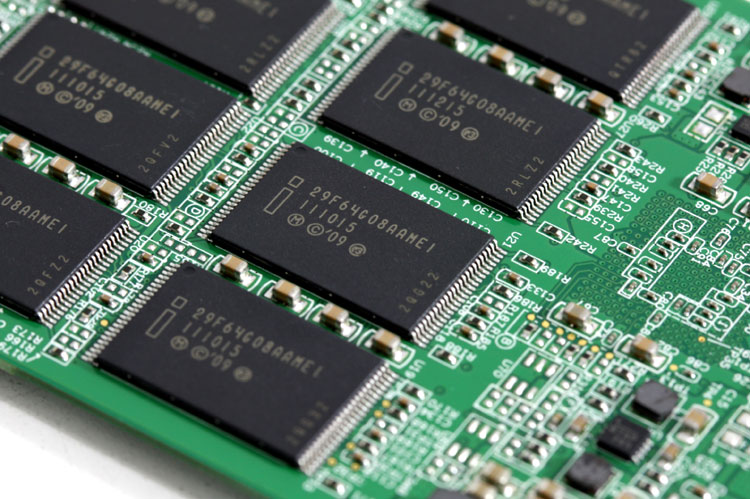Final words and conclusion
Final words and conclusion
The S511 series SSD from ADATA is again a product that will offer some serious performance for hopefully a slightly more acceptable amount of money. Comparing apples to apples, SATA3 SSDs like Corsairs Force series, the OCZ Agility 3 and Vertex 3, Patriots WildFire and so on are neck and neck with each other. Overall IOPS performance is where they rock alright thanks to the SandForce controller. Whether or not you'd ever physically notice or need so much IOPS performance is what we slowly start to doubt though.
The overall performance to previously tested SSD units for the S511 Turbo is good, admittedly here and there lacks shows some offsets in write performance compared to that oh so tough competition We spotted a read perf anomaly with IOMeter and PCMark Vantage as well, but overall performance definitely is very promising.
The sheer peak performance, and then the sustained performance throughout of the SSD is ridiculously fast. If you put a drive like this into your SATA 3 compatible laptop or SATA 3 compatible PC, you'll have no idea what is about to hit you.

That SandForce 2200 series Firmware bug? We stated it a couple of times already -- Initial batches of SSDs based on this controller have produced a lot of issues for a significant group of people. Over the past few months there have been a lot of fixes and firmware updates for all board partners. Things seems to have stabilized with the latest firmware releases, the ADATA S511 series will obviously get the latest revision version in it.
As a policy these days we've been running the SSD for a full week now in one of the test systems. We have not seen any issues, but being this late to the market with this SSD results into an advanced and stabilized firmware.
Some overall recommendations then. Should you be in the market for a SATA3 SSD then we have a couple of hints though, we absolutely prefer the performance of the Intel Series 6 (H67/P67/Z68/X79) integrated SATA 6G controller over anything else available in the market. If you run an AMD chipset with the added Marvell 6G controller for example, you will see lower performance, make no mistake about that. Also make sure you run your drive in AHCI mode, it does make a difference.
Prices HDD versus SSD -- well my advice is simple and I'll keep repeating this in each and every SSD conclusion; you probably should stop looking at the Solid State Disk technology as if it were a traditional HDD. We all will be old and grey before the two reach the same prices or top the multiple TB volume storage the HDD offers for less money. Comparing an SSD with an HDD is making a comparison in-between an integrated IGP or a dedicated graphics card, that last one will cost you a heck of a lot more yet you gain incredible overall performance. It is the very same with an SSD, use it as boot drive on Windows and applications and you instantly have removed a huge bottleneck, load and access times. It is a difference in-between night and day (in a proper system). For massive storage like movies, MP3 files and bulky data you do not access on a regular basis, sure that's where the HDD remains the winner.
The magic simply is finding a good combination in-between the two and balance things out. That's where the magic happens. I kid you not, all my test systems and work systems run on SSDs, not once have I considered going back to HDDs. The benefits of a good SSD are simply grand. But that doesn't mean I do not understand the budget and cost dilemma that many of you are facing though. There are still many variables and unknowns regarding life-span.
The 25nm NAND Flash memory versus SSD lifespan, the verdict isn't in just yet, but if you do the math based on very heavy consumer usage, it should not be worrying. That hypothesis flips around if you'd be planning to use it in a high traffic server or something. But even then it would probably last years. Admittedly, I still like the previous generation NAND FLASH ICs better though as the life-cycle of the NAND flash simply was double of what it is now, and what people seek is reliability, not cost effective methods that can shorten lifespan.
So there you have it, if you are seeking l33t performance in the storage segment then the S511 series offers just that, really good performance. Hopefully you can find it for a price that is acceptable for you. The product is fairly similar to OCZ, Patriot and Corsair's latest SSDs with that SandForce 2281 Controller based products so ultimately I'd go for the best price versus warranty if I where you, ADATA offers three years of it.
We end this article with the words we always say, an SSD is the best upgrade a modern PC can use, your operating system flies, there are no waits which you normally have with an HDD, there's no noise and hardly any power consumption. An SSD really the best upgrade any modern age PC or laptop can use. If you have a proper PC with a SATA3 controller, the S511 definitely is a amiable product. If you are still on a SATA2 platform and have no urge to upgrade, obviously we'd recommend a SATA2 SSD and save yourself some money. Regardless, we can recommend the S511 series as much as any Sandforce 2281 controller based product on the market.
- Leave/read comments on this product
- Sign up to receive a notice when we publish a new article
- Or go back to Guru3D's front page
